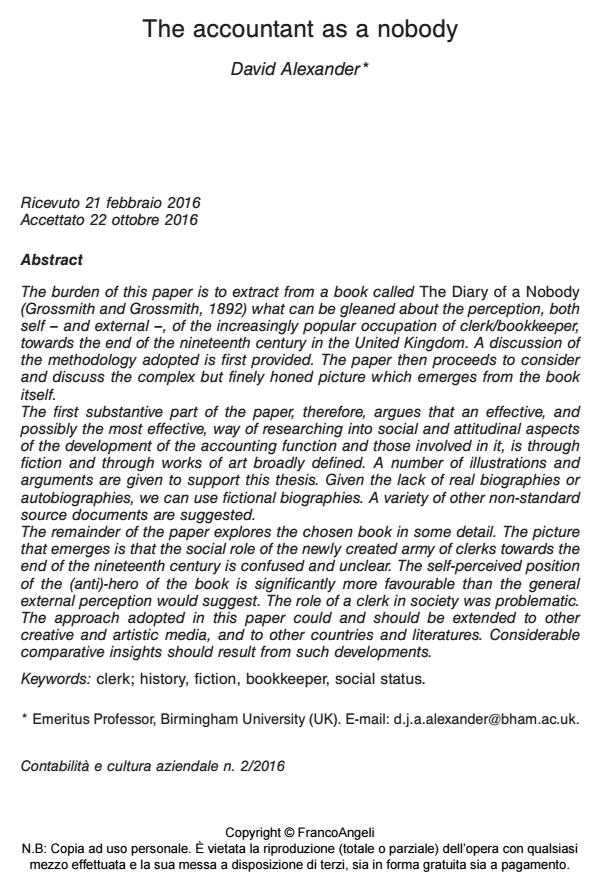The accountant as a nobody
Titolo Rivista CONTABILITÀ E CULTURA AZIENDALE
Autori/Curatori David Alexander
Anno di pubblicazione 2017 Fascicolo 2016/2 Lingua Inglese
Numero pagine 19 P. 45-63 Dimensione file 654 KB
DOI 10.3280/CCA2016-002003
Il DOI è il codice a barre della proprietà intellettuale: per saperne di più
clicca qui
Qui sotto puoi vedere in anteprima la prima pagina di questo articolo.
Se questo articolo ti interessa, lo puoi acquistare (e scaricare in formato pdf) seguendo le facili indicazioni per acquistare il download credit. Acquista Download Credits per scaricare questo Articolo in formato PDF

FrancoAngeli è membro della Publishers International Linking Association, Inc (PILA)associazione indipendente e non profit per facilitare (attraverso i servizi tecnologici implementati da CrossRef.org) l’accesso degli studiosi ai contenuti digitali nelle pubblicazioni professionali e scientifiche
The burden of this paper is to extract from a book called The Diary of a Nobody (Grossmith and Grossmith, 1892) what can be gleaned about the perception, both self - and external -, of the increasingly popular occupation of clerk/bookkeeper, towards the end of the nineteenth century in the United Kingdom. A discussion of the methodology adopted is first provided. The paper then proceeds to consider and discuss the complex but finely honed picture which emerges from the book itself. The first substantive part of the paper, therefore, argues that an effective, and possibly the most effective, way of researching into social and attitudinal aspects of the development of the accounting function and those involved in it, is through fiction and through works of art broadly defined. A number of illustrations and arguments are given to support this thesis. Given the lack of real biographies or autobiographies, we can use fictional biographies. A variety of other non-standard source documents are suggested. The remainder of the paper explores the chosen book in some detail. The picture that emerges is that the social role of the newly created army of clerks towards the end of the nineteenth century is confused and unclear. The self-perceived position of the (anti)-hero of the book is significantly more favourable than the general external perception would suggest. The role of a clerk in society was problematic. The approach adopted in this paper could and should be extended to other creative and artistic media, and to other countries and literatures. Considerable comparative insights should result from such developments.
Keywords:Clerk; history, fiction, bookkeeper, social status
- Brown J.M. (1982). Dickens: Novelist in the Market-Place.
- de Bernières L. (1994). Captain Corelli’s Mandolin. London: Martin Secker &
- Warburg. Dictionary (1893). A New English Dictionary on Historical Principles, Vol. II Part I, edited JAH Murray. Oxford: Clarendon Press.
- Dictionary (1901). A New English Dictionary on Historical Principles, Vol. IV Part II, edited by Henry Bradley. Oxford: Clarendon Press.
- Financial Times (2000). Fixers have had a long Innings. Weekend FT, 13th May. London.
- Fraser I., Gallhofer S., Haslam J., & Sydserff R. (2000). Dickens and Accounting History: Towards a Critical Appreciation. Paper given at BAA Annual Conference; Exeter, April.
- Gibbon E. (1960). Decline and Fall of the Roman Empire (one volume abridgement). London: Penguin. Originally published between 1776 and 1788.
- Green J. (1984). The Cynic’s Lexicon. London: Routledge and Kegan Paul (edition by Sphere Bookes, London, 1986).
- Grossmith G. & Grossmith W. (1892/1924) (also Penguin, 1995, London). The Diary of a Nobody. London: J.W. Arrowsmith.
- Hay I. (1915). The First Hundred Thousand. London & Edinburgh: Blackwood. Johnson S. (1755). Dictionary.
- Loebbecke J. (1998). The Auditor: An Instructional Novella. New Jersey: Prentice Hall.
- Milligan S. (1970). The Bedsitting Room: Margaret & Ja. Walton-on-Thames.
- Milligan S. (1971). Adolf Hitler: My part in his Downfall. London: Penguin edition (1972).
- Parker R.H. (2001). Accounting on the Periphery: The Profession in Exeter to 1939; Paper presented at 7 Ème Journées d’Histoire de la Comptabilité et du Management; St Nazaire, March (and in an earlier draft at BAA Annual Conference, April 2000).
- Remarque E (1929). All Quiet on the Western Front. London: Putman.
- Snowden D. (2000 a, b). The Art and Science of Story or “Are you sitting uncomfortably?”. Business Information Review, Part 1, 17(3), Part 2 17 (4).
- Stone D. (2001). Didactic Fiction as Research Method. The Accounting Review, 76, 2: 285-290.
- TW3 (1963). That Was the Week that Was. London: W.H.Allen.
- Taylor J. (ed) (1989). The Wine Quotation Book. A literary celebration. London: Robert Hale.
- Timko M. (1987). Dickens, Carlyle, and the Chaos of Being. Dickens Studies Annual: Essays on Viictorian Fiction, 16: 1-16.
- The musical, cultural and financial life and legacy of Tito Schipa Stefano Adamo, David Alexander, Roberta Fasiello, Tito Junior Schipa, in CONTABILITÀ E CULTURA AZIENDALE 2/2023 pp.53
DOI: 10.3280/CCA2022-002004
David Alexander, The accountant as a nobody in "CONTABILITÀ E CULTURA AZIENDALE" 2/2016, pp 45-63, DOI: 10.3280/CCA2016-002003